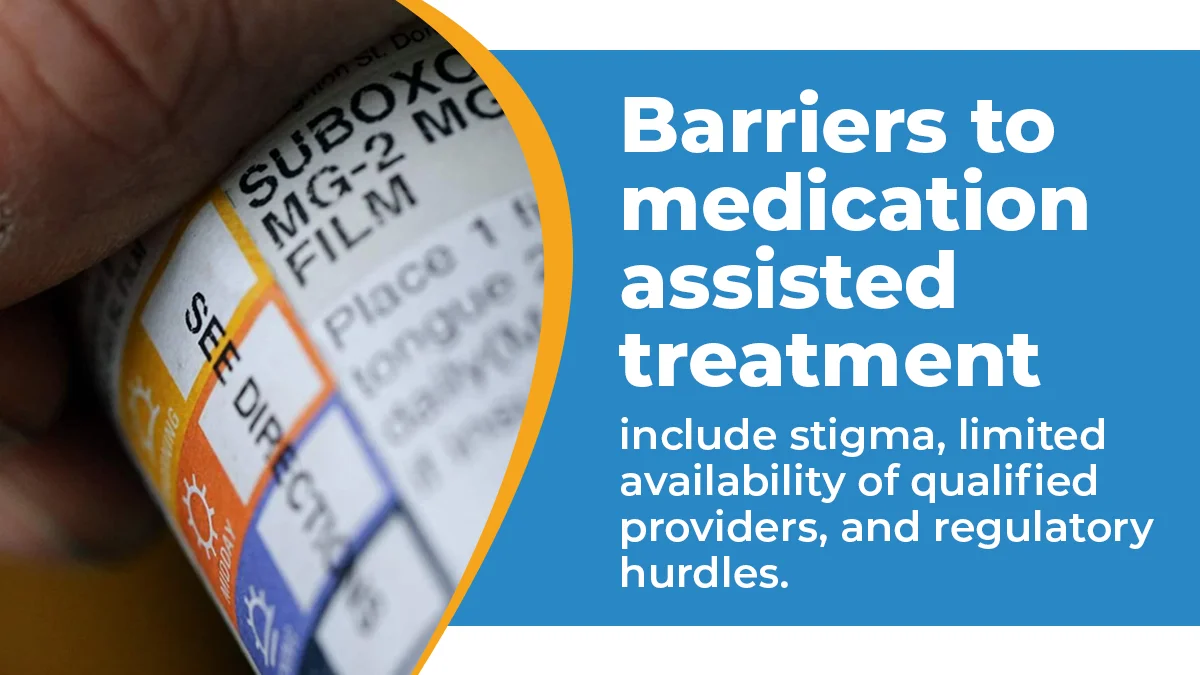
Using Tramadol To Manage Suboxone Withdrawal
Explore the role of tramadol in managing suboxone withdrawal symptoms with The Recovery Team-Newton.

Medication-assisted treatment (MAT) is a widely recognized approach for addressing substance use disorders. It integrates medications with counseling and behavioral therapies. However, despite its effectiveness, MAT encounters numerous barriers that hinder its effectiveness.
These barriers range from societal stigma to limited access to healthcare services. Continue reading to explore various barriers to MAT and discover strategies to overcome them to maximize the benefits of MAT for battling addiction.
Medication-assisted treatment integrates medications with therapy to treat addiction and support recovery effectively. Here’s what the article entails:
The Recovery Team-Newton offers supervised medication-assisted treatment to help you overcome addiction. Call us at (508) 978-2772 for information.
Medication-assisted treatment (MAT) combines medication with counseling and behavioral therapies to treat substance use disorders. It’s often used for the treatment of opioid use disorder (OUD). Medications like methadone, buprenorphine, and naltrexone help reduce cravings and withdrawal symptoms. MAT aims to block the effects of drugs, supporting long-term recovery.
MAT is often personalized, considering factors like the type of substance used and individual needs. It’s proven effective in reducing substance abuse, overdose deaths, and criminal activity. MAT is not a standalone treatment; it’s part of a comprehensive approach that includes counseling, support groups, and lifestyle changes for lasting recovery.
Despite its benefits, MAT faces stigma and misconceptions. However, research shows MAT significantly improves treatment retention and reduces the risk of relapse. By addressing both the physical and psychological aspects of addiction, MAT offers a holistic approach to recovery, empowering individuals to reclaim their lives from substance use disorders.
Accessing MAT for OUD treatment poses significant challenges due to various barriers. Limited availability of treatment facilities, geographic disparities, and insurance and cost issues hinder patients’ access to essential care, particularly in rural areas of the United States. Addressing these barriers is vital in combating the barriers associated with MAT.
Access to medication-assisted treatment (MAT) for opioid use disorder (OUD) is hindered by a scarcity of treatment facilities. Rural areas, in particular, face challenges in providing adequate services, exacerbating disparities in healthcare access across different regions of the United States.
Geographical factors contribute to the unequal distribution of MAT resources, leaving rural communities underserved. Limited access to healthcare facilities in remote areas compounds the difficulties faced by individuals seeking medication treatment for OUD, exacerbating the opioid crisis in these regions.
High treatment costs and insurance barriers create significant hurdles for patients in accessing medication-assisted treatment. Financial constraints often deter individuals from seeking necessary care, perpetuating negative attitudes towards MAT and impeding efforts to combat opioid addiction in rural settings.
Regulatory and policy barriers hinder medication-assisted treatment programs. Legal restrictions on prescribing medications limit access. Administrative burdens increase paperwork for healthcare providers. Variability in regulations between states and federal authorities complicates implementation.
Legal restrictions limit access to agonist medications. Healthcare providers face hurdles in prescribing necessary treatments, which impacts evidence-based treatment delivery. Overcoming legal barriers is important for expanding treatment coverage.
Administrative burdens create obstacles for healthcare providers. Excessive paperwork consumes time and resources. Simplifying administrative processes can streamline treatment delivery. Paperwork reduction allows for more focus on patient care.
Variability in regulations poses challenges for treatment programs. Inconsistent policy changes and guidelines between state officials and federal agencies create confusion. Harmonizing regulations could enhance treatment accessibility and effectiveness. Collaboration between authorities is essential for addressing regulatory disparities.
Social and cultural barriers pose significant challenges to MAT for substance use disorders. Stigma, misinformation, and community or family opposition hinder the effectiveness of medical interventions. Overcoming these obstacles is crucial to ensure that individuals receive the support they need within the treatment system.
Stigma deters effective treatment by discouraging individuals from seeking medical help for drug use. It fosters misconceptions about medication-assisted treatment (MAT), hindering its acceptance. This stigma isolates individuals, depriving them of social support within the treatment system.
Misinformation about MAT creates additional barriers to effective treatment. False beliefs about its efficacy and safety undermine its utilization. Such misconceptions deter individuals from accessing medical assistance for their substance use disorders, impeding their recovery process.
Opposition from communities and families compounds challenges in treating substance use disorders. Lack of support within these social circles isolates individuals, making it harder for them to seek and maintain effective treatment. Community and family disapproval further exacerbates the existing barriers within the treatment system.
Medication-assisted treatment (MAT) holds promise in combating substance abuse, yet numerous barriers within the healthcare system impede its effectiveness. Key challenges include a shortage of trained providers, insufficient screening processes, and poor integration with primary care. Addressing these barriers is vital for enhancing access to MAT and improving public health outcomes.
A shortage of trained healthcare providers restricts access to vital medical treatment for substance abuse cases. Patients may not receive appropriate care without sufficient expertise, worsening health outcomes, and prolonged suffering.
Inadequate screening and referral processes delay or miss crucial opportunities for intervention in substance abuse cases. Without proper identification and referral mechanisms, individuals in need may not receive timely access to medication-assisted treatment, negatively impacting public health efforts.
Poor integration with primary care exacerbates the challenge of addressing substance abuse within the healthcare system. Fragmented care leads to disjointed treatment plans and suboptimal outcomes for patients requiring medication-assisted treatment, impeding efforts to improve overall public health.
Barriers unique to each patient, such as financial issues or a lack of social support, hinder access to medication-assisted treatment. Personal factors such as fear of stigma may also contribute to reluctance to seek treatment. Overcoming these barriers requires tailored approaches that address individual needs and circumstances.
Patients may not follow prescribed courses of action due to forgetfulness, skepticism about treatment efficacy, or concerns about side effects. Missing medication doses or skipping therapy sessions can impede treatment effectiveness and prolong the recovery process. Education and support can help address these challenges.
Experiencing multiple mental health issues concurrently complicates treatment, requiring integrated approaches. Conditions like depression and substance abuse often coexist, necessitating comprehensive care strategies. Addressing the interconnected nature of these disorders is crucial for effective management and improving overall outcomes.
Transportation difficulties, whether due to lack of options or physical disabilities, hinder access to treatment services. Financial constraints may prevent individuals from accessing public transit or alternative transportation methods. Overcoming these challenges requires innovative solutions to ensure individuals can attend appointments and maintain continuity of care.
Psychosocial barriers encompass mental and social factors that hinder medication-assisted treatment (MAT) for substance use disorders. Stigma, lack of social support, and psychological issues can impede engagement and success in MAT, affecting treatment outcomes and recovery.
Housing instability, including homelessness or frequent moves, disrupts access to MAT. It complicates maintaining regular medical appointments, safe medication storage, and establishing stable routines necessary for treatment effectiveness. Unstable housing situations pose significant challenges for individuals seeking and adhering to MAT.
Employment difficulties, such as unstable or low-income jobs, create barriers to MAT. Financial constraints, limited health insurance, and lack of paid time off for medical appointments hinder access to treatment. Employment instability also increases stress levels, affecting treatment adherence and overall outcomes.
Social support networks, including family, friends, and community resources, play a crucial role in MAT’s success. Strong support provides encouragement, accountability, and assistance with everyday challenges, enhancing treatment engagement and recovery. Inadequate support may hinder progress, highlighting the importance of robust social networks in MAT.
We need education to tackle hurdles in medication-assisted treatment (MAT). Communities should know MAT works against substance use disorders. Healthcare providers need training on MAT and its importance. Also, bringing MAT services closer in rural areas helps remove barriers.
We must fight the stigma around MAT. Public campaigns can clear up misunderstandings. Sharing success stories can also help. Integrating MAT into regular healthcare can make it more normal and reduce stigma.
Improving insurance coverage is vital. We need policies that make insurance cover MAT well. Also, offering help to those who can’t afford it is critical. By fixing these issues, more people can benefit from MAT.
Barriers to medication-assisted therapy include stigma, limited access, and cost. Some people feel embarrassed or judged for seeking help. It’s hard to find a nearby provider, especially in rural areas. Treatment costs can be high, causing money problems. Side effects and fear of dependence also stop some.
Additionally, there’s not enough education about these therapies. False information makes people doubt them. Lastly, rules can make it hard to get certain medications. Overall, stigma, access, cost, side effects, misinformation, and regulations make it challenging for people to get medication-assisted therapy.
Medication-assisted treatment (MAT) helps addiction, but it has drawbacks. Side effects like nausea or sleep issues can occur. Some people may misuse or sell their medication. It can be costly without insurance. MAT might need regular doctor visits, which is time-consuming.
Not all medicines work for everyone, so finding the right one can take time. The stigma around MAT might make people hesitant to seek help. Dependency on medication can happen if not appropriately monitored. While MAT is helpful, it’s essential to consider its potential downsides and work closely with healthcare providers for the best outcome.
Medication-assisted treatment is a powerful way to tackle addiction. It combines counseling with medicines to manage cravings and withdrawal symptoms. Drugs like methadone, buprenorphine, and naltrexone are commonly used to help reduce cravings and bring the brain back to normal.
This boosts the chances of recovery and lowers the risk of going back to drugs. Doctors and experts support this method because it’s based on solid evidence. Sticking closely to the treatment plan is crucial to make it work best. When combined with therapy, medication creates a strong strategy for overcoming addiction and leading a sober life.
Struggling with addiction can be overwhelming, but you don’t have to face it alone. Reach out to The Recovery Team-Newton for expert guidance.
Our facility offers a day treatment program designed to empower you on your journey to overcoming substance use disorders. Our comprehensive program blends medication-assisted treatment, evidence-based therapies, and holistic approaches to support your journey toward recovery.
Call us at (508) 978-2772 to learn more about our services, and let us help you pave the path to a life filled with hope, healing, and resilience.

Explore the role of tramadol in managing suboxone withdrawal symptoms with The Recovery Team-Newton.

Explore the basics of insurance coverage for suboxone treatment in this guide from The Recovery Team-Newton.

Explore the effectiveness of medication-assisted treatment with The Recovery Team-Newton.